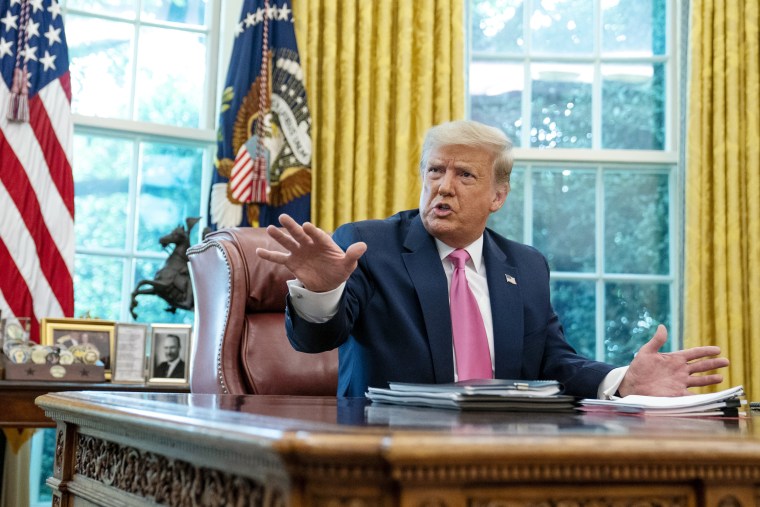As significant as the economic losses have been during the coronavirus crisis, the CARES Act, approved in March, has served as an important lifeline for millions. Its benefits, however, were temporary -- and they're poised to end. The question is what, if anything, federal policymakers intend to do about it.
House Democrats, eager to stay ahead of the problem, approved a $3 trillion economic aid package on May 15. As regular readers know, Senate Republicans and the White House responded by condemning the progressive plan, while suggesting they'd eventually get around to proposing a GOP alternative.
Those Republican efforts don't appear to be going well.
President Donald Trump is throwing a big wrench into negotiations between the White House and Senate Republicans over the next coronavirus relief bill by demanding a payroll tax cut be included and funding for testing be reduced or cut completely. Leaving meetings on Capitol Hill Monday night, Treasury Secretary Steven Mnuchin and White House Chief of Staff Mark Meadows said that the payroll tax cut is in the yet-to-be released bill despite Republican senators saying they don’t think it’s good policy.
Even by 2020 standards, this is quite nutty. As NBC News' reporting indicates, Trump is focused on a payroll tax break -- which, as we discussed last week, is a foolish approach given the economic circumstances -- and cutting investments in coronavirus testing, which is simply bonkers in the midst of the pandemic.
Just as importantly, the president's fixation on these misguided ideas has divided his party, leaving GOP officials without a plan. Eventually, Republican leaders will likely work something out among themselves, but that will lead to negotiations -- which have not begun in earnest -- with the Democratic House majority.
And those talks are likely to be vastly more difficult than the initial rounds of negotiations over coronavirus aid packages in the spring, especially since Democrats remain committed to enhanced unemployment benefits -- one of the elements of the CARES Act that Republicans are most eager to scale back.
Dems are also desperate to invest in struggling state and local governments, while GOP officials are opposed to any such funding.
I won't pretend to know what's going to happen, but the timeline is of particular significance right now. The broad understanding is that CARES Act benefits expire at the end of July, which suggests policymakers have this week and next to work something out. A closer look, however, reveals a more compressed calendar.
As the New York Times' Paul Krugman explained in a recent column, the $600 weekly supplement for the unemployed "applies only to benefit weeks that end 'on or before July 31.' July 31 is a Friday. State unemployment benefit weeks typically end on Saturday or Sunday. So the supplement will end, in most places, on July 25 or 26, and millions of workers will see their incomes plunge 60 percent or more just a few days from now."
What's more, an NBC News report added yesterday, "With no national moratorium on evictions, most protections were put in place on the state and local levels, and they either have already expired or will expire within a few weeks. A federal law barring evictions from properties serviced by federally backed mortgages comes to an end Saturday."
That's this Saturday -- which is to say, the eviction moratorium for federally backed mortgages ends this week, shortly before enhanced unemployment benefits expire.
Is it possible that Republicans will settle on a plan, start negotiations with Democrats, and celebrate as a worthwhile, bipartisan blueprint comes together in a few days? I suppose anything's possible, but given the White House's current demands, there's no reason for optimism.

